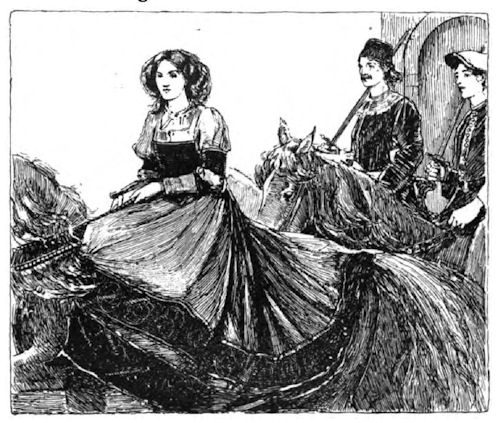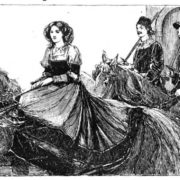TALL TALES FOR A LONG WINTER NIGHT “Lord Thomas and Fair Ellender”
TALL TALES FOR A LONG WINTER NIGHT
“Lord Thomas and Fair Ellender”
 I remember when working on Singin’ the Moon Up – The Voice of Jean Ritchie at Penn State University in the summer of 2005, we had many long ballads to memorize and get ready to perform, most of which were sung a cappella. I spent many a long afternoon riding in my car listening over and over and over to Jean’s recordings of these songs until I had them memorized myself, and I found it transporting. I was drawn back easily in my imagination to the times and scenes of the stories within these long tales (mostly of woe!).
I remember when working on Singin’ the Moon Up – The Voice of Jean Ritchie at Penn State University in the summer of 2005, we had many long ballads to memorize and get ready to perform, most of which were sung a cappella. I spent many a long afternoon riding in my car listening over and over and over to Jean’s recordings of these songs until I had them memorized myself, and I found it transporting. I was drawn back easily in my imagination to the times and scenes of the stories within these long tales (mostly of woe!).
Jean has always told me that the long ballads that were passed down through the generations were carried because of the telling nature of the stories: they were like morality tales, though the children who heard them and learned them in the mountains didn’t think that at the time. They just loved the adventure. And adventure there was, with “stobbings” and cutting off heads and, yes, “kicking them against the wall!” I asked Jean whether those violent acts in the songs would frighten her and her siblings and other young children or even traumatize them. But she said, no they didn’t: they were just “amazed that romance could cause an action like that to be taken.”
From her book, Singing Family of the Cumberlands:
When young folks got tired between spells of dancing or playing games, they’d plop down around a fireside and sing for hours. Everybody sang what he knew all around a circle. Any time there was a song you didn’t know, you would just keep singin’ it till it got learnt. Some of the oldest songs were swapped here, especially when everyone got quiet and still. That was a time to listen to a good long tale. These songs had visions of castles, ships, lords and ladies, of far off lands and exotic places like London Town, Dublin Town, Bonny Scotland. The thought that these places could really exist outside of the mountains, forever left their impression.
“Ole timey love longs”. Violent that they were you just thought about the romance.
One song in particular got my attention after watching a live performance that Jean gave of it with her two sons, Jon and Peter Pickow, accompanying Jean and her wonderful dulcimer. “Lord Thomas and Fair Ellender” told the story of a well-born Lord who was in love with “Fair Ellender.” He thought to ask his mother whether he should marry Ellender or “the brown girl” who owned lots of property and was obviously well-off. He goes to tell Ellender of his decision to marry the brown girl and invite Ellender to the wedding. Ellender also asks her mother for advice and even though the mother advises her not to go to the wedding, she intends to go and does so, to tragic outcome. I was lucky enough to have both Jon and Peter join me and Kenny Kosek on stage to perform this song that is listed as Child Ballad # 73, dated from its earliest known record from the 17th century.
Jean writes about learning this song as a child on her front porch Kentucky evening in Singing Family…
…the people in the ballads would pass before me out there in the sparkly dusk. The song itself seemed unreal and far, far away, telling dreamily of Fair Ellender and Lord Thomas and courts and processions, love and death, but the people my half-closed eyes saw were alive and beautiful. Fair Ellender rode slowly by on her snow-white horse, her hair like long strands of silver and her face like milk in the moonlight. Then came her waiting maids, dressed all in green and holding their heads high and proud. There was Lord Thomas, tall and brave with his sword shining in his hand, there the wedding folk around the long table. Then, in some easy manner that never had to be explained, I became Fair Ellender, and the movement of the swing I sat in became the slow, graceful walking of the white horse. Hundreds of people lined the broad highway as I rode by, thinking I was some queen, as the song wound its way to the tragic ending.
Lord Thomas and Fair Ellender
O Mother, O Mother, come riddle it down,
Come riddle two hearts as one.
O must I marry fair Ellender
Or bring the brown girl home?
The brown girl she has houses and lands,
Fair Ellender she has none,
So the best advice I can give you, my son,
Is go bring me the brown girl home.
He rode till he come to fair Ellender’s gate
He tinkled the bell with his cane,
No one so ready as fair Ellender herself
To arise and bid him come in.
O what’s the news Lord Thomas, she cried,
What’s the news you brung to me?
I’ve come to ask you to my wedding
Now what do you think of me?
O Mother, O Mother, come riddle it down
Come riddle two hearts as one,
O must I go to Lord Thomas’s wedding
Or stay at home and mourn?
The brown girl she’s got business there
You know you have got none
So the best advice I can give you my daughter,
Is to stay at home and mourn.
She dressed herself in a snow white dress,
Her maids they dressed in green,
And every town that they rode through
They took her to be some queen.
She rode till she came to Lord Thomas’s gate,
She pulled all in her reins,
No one so ready as Lord Thomas himself
To arise and bid her come in.
He took her by her lily white hand
He led her through the hall,
He seated her down in a rockin’ chair
Amongst those ladies all.
Is this your bride, Lord Thomas, she cried?
She looks so wonderful brown!
You once could have married a maiden as fair
As ever the sun shone on.
Dispraise her not, fair Ellender, he cried,
Dispraise her not to me,
For I think more of your little finger
Than of her whole body.
The brown girl had a little pen knife
It being both keen and sharp,
Betwixt the long ribs and the short
Pierced fair Ellender to the heart.
O what’s the matter Lord Thomas, he cried,
You look so pale and wan,
You used to have as rosy a color
As ever the sun shone on.
O are you blind, Lord Thomas, she cried,
Or is it you cannot see?
And can’t you see my own heart’s blood
Come trinkling down to my knee?
Lord Thomas he drew his sword from his side
He ran all through the hall,
He cut off the head of his bonny brown bride
And kicked it against the wall.
Then placing the handle a-towards the wall,
And the blade a-towards his heart,
Saying did you ever see three true lovers meet
That had so soon to part?
O Mother, O Mother, go dig my grave
Go dig it both wide and deep,
And bury fair Ellender in my arms
And the brown girl at my feet.
A sweet epilogue from a six year old Jean Ritchie:
And so I died, as Fair Ellender, but even death seemed lovely and romantic in that song; I could imagine how the wedding guests gathered around as I lay with my pale hair spread about me on the floor, everybody weeping and saying how beautiful I was, even in death. I gave myself up completely to wonderful dreams, forgetting until tomorrow that life was not really like that. For even though I was only six, I had begun to have my troubles, and to me they seem mighty big ones.
Further research into the origins of this particular ballad from The English and Scottish Popular Ballads edited by Francis James Child states the song titles have been known variously as “Lord Thomas and Fair Annet,” “The Nut-Brown Bride,” “The Brown Bride and Lord Thomas,” Sweet Willie and Fair Annie,” “Fair Annie and Sweet Willie,” and finally “Lord Thomas and Fair Ellinor,” which obviously evolved into the version that became the Ritchie family’s “Fair Ellender.” I’ve seen the song performed contemporarily as “The Brown Girl.” It’s such a thrill to read in the Child book, version D, “Lord Thomas and Fair Ellinor” and actually see almost the exact wording of the song I’ve listed above, handed down straight through the generations by oral tradition alone, to travel and rest in the ears and minds and memories of those like the Ritchies in Eastern Kentucky, forebears and tradition bearers from England and Scotland, and bringing with them words and stories from centuries ago.
I urge you to listen to the recordings here in a quiet place, your winter quietness around you. Close your eyes and let the words paint the scenes for you, with your imagination alone, and let the story take you away as it did many countless generations before us. Jean Ritchie’s family always said that “all folk songs are true” so this must be the case – the tragedy from the 17th century can speak to us today.
Let yourself take the winter journey around the firelight this winter.
Here is my rendition on White Swan:
Fair Ellender
Susie Glaze
Award-winning recording artist and critically-acclaimed folk and Americana powerhouse vocalist, Susie Glaze has been called by BLUEGRASS UNLIMITED “an important voice on the California Bluegrass scene.” Her album “Blue Eyed Darlin'” was the winner of the Just Plain Folks 2006 Music Award for Best Roots Album and FolkWorks Magazine’s Pick for Best Bluegrass Album of 2005. “One of the most beautiful voices in bluegrass and folk music today.” (Roz Larman of FolkScene). With her Hilonesome Band, their latest release “White Swan” was critically acclaimed by No Depression, FolkWorks, Pop Matters, M Magazine for Musicians, Music News Nashville and FolkWords UK, and their new album for 2015 “Not That Kind of Girl” was produced by LA acoustic music legend Herb Pedersen. Susie is also part of the new tribute album “Dear Jean – Artists Celebrate Jean Ritchie” alongside such artists as Judy Collins, Pete Seeger, Janis Ian, and many more. www.susieglaze.com













